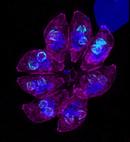Welcome at the Chair for Experimental Parasitology

Professor Markus Meissner
Overview
Protozoan parasites represent fascinating organisms with their own evolutionary history, giving rise to unique adaptation and novel biological pathways that can be very distinct to other eukaryotes. In fact, one has to consider that much of our knowledge on fundamental biological processes has been derived from a single eukaryotic clade, the ophistokonts (from yeast to human) and current research demonstrates that biochemical pathways, organelles and even basic processes, such as gene regulation mechanisms can be very distinct between different phyli and in fact are sometimes unrelated. A good example is the evolution of the endomembrane system, endocytosis, endosymbiosis or host-pathogen co-evolution.
At the Chair for Experimental Parasitology we believe that understanding similarities and differences between protozoan parasites and other eukaryotes (i.e. their hosts) will not only lead to important insights in fundamental biology and provide a snapshot of the evolution of certain processes, it will also lead directly to a better understanding of the unique biology of protozoan parasites and therefore to future translational approaches that can lead to novel intervention strategies against these important pathogens.
Currently we focus on these protozoan parasites:
- Toxoplasma gondii and Plasmodium falciparum (Professor Meissner)
- Trypanosoma brucei (Professor Siegel)

